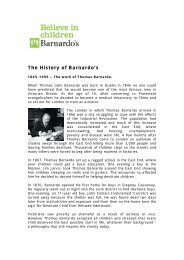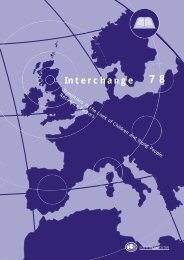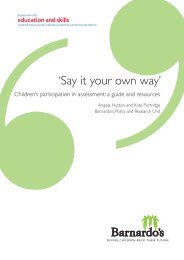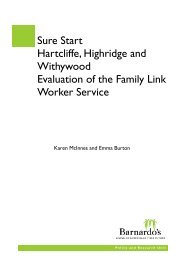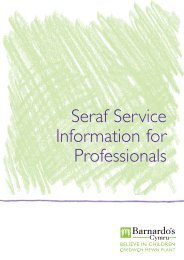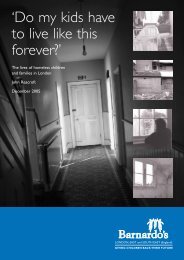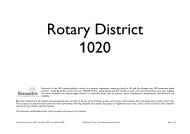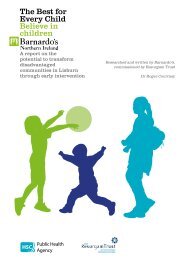Splintered Lives - Barnardo's
Splintered Lives - Barnardo's
Splintered Lives - Barnardo's
Create successful ePaper yourself
Turn your PDF publications into a flip-book with our unique Google optimized e-Paper software.
1 (1) (a)<br />
"It is an offence to take, or permit to be taken, any indecent photograph of a child."<br />
This provision also included film, and was subsequently extended to video recordings.<br />
Furthermore it became an offence to possess child pornography with the intention to<br />
show or distribute it to others. There was no definition of indecency, this being defined<br />
through legal precedent; 10 years of court of appeal judgements were based upon<br />
"standards of recognised propriety". A 1989 appeal court judgement stated that<br />
decisions could be reached in terms of the representation itself, it was not necessary to<br />
place it in the context of how it was produced.<br />
Proving intention to show or distribute was problematic, and many owners argued that<br />
what they possessed was merely their own private collection. This difficulty resulted in<br />
Section 160 of the Criminal Justice Act 1988, which made possession of child<br />
pornography without legitimate reason (examples here would be OPS) a penal offence.<br />
It was, however, not an arrestable offence meaning the police had no powers of search.<br />
Flynn (1988) argued for an increase in the penalties for possession which would in turn<br />
make it an arrestable offence. The most recent Criminal Justice Act includes greater<br />
powers to search for and seize computer porn, but there is still no legal framework for<br />
prosecuting material accessed via bulletin boards as this is not covered by importation<br />
legislations.<br />
Britain is one of very few European countries to make simple possession of child<br />
pornography an offence. Susan Edwards (1995) providing an overview of the current<br />
legal situation notes that although the most recent Criminal Justice Act made<br />
possession a serious arrestable offence, with a possible upper penalty of six months<br />
imprisonment, the impact is likely to be minimal. She highlights the fact that this<br />
amendment was made in a reactive context following concerns raised in the Jamie<br />
Bulger case. The primary concern was to be seen to be doing something about<br />
children's access to pornography, rather than the exploitation of children within it. In<br />
terms of child prostitution, the Street Offenses Act 1959 makes no distinction between<br />
adults, young people or children. It is this fact which creates the situation in which<br />
some 15 and 16 year olds have not only cautions for soliciting, but also convictions.<br />
She also notes the problem of inconsistency between the variety of legislation covering<br />
this area23 in relation to the terms and legal tests used. She supports a harm-based<br />
definition (see Itzin, 1993 and 1995) replacing the problematic 'obscenity' test. Further<br />
problems arise in relation to written material which is not currently prosecutable (thus<br />
failing to address UN concerns about materials which "promote" sexual abuse) and the<br />
fact that some of the legislation requires that those in the representations "appear<br />
under 16". B




